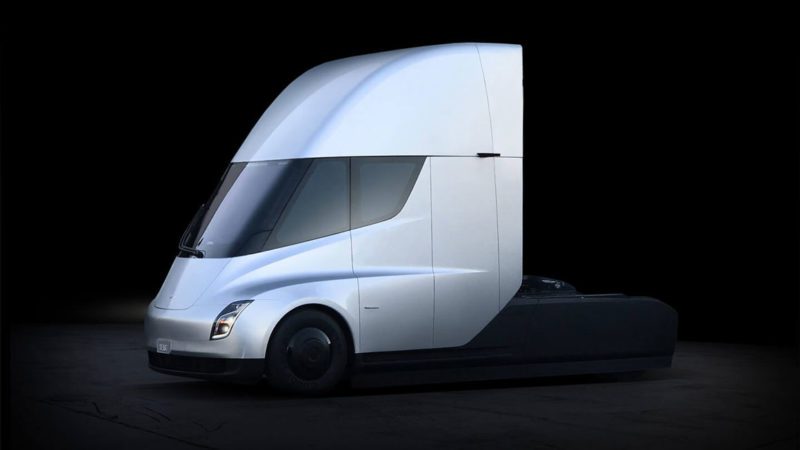Tesla is now the most valuable car company on the planet after the value of its shares topped $US1,000 on Wednesday morning (US time).
Tesla shares surged to close at $US1,025.05 ($A1,470.43) on June 10, bringing its market cap to $US190 billion ($A272.55 billion) – and ahead of Toyota’s $US182 billion – after a staff email was leaked in which CEO Elon Musk wrote: “It’s time to go all out and bring the Tesla Semi to volume production”.
Musk later confirmed on Twitter that the email is “legit”.
Yes
— Elon Musk (@elonmusk) June 10, 2020
The timing of the letter was interesting (and perhaps even deliberate) given that fellow electric car brand Nikola eclipsed the value of US legacy car maker Ford on Tuesday following the announcement its hydrogen-powered Badge ute (or, pickup in the US) would be opened for reservation in June.
Unlike Tesla, Nikola’s focus is not on the passenger market – although CEO and founder Trevor Milton has explicitly said both Tesla and Ford are in the company’s sights.
Instead, it is planning a series of hydrogen-powered trucks that would compete against the $US150,000 (base price, $A215,170 converted) Tesla Semi.
However, also unlike Tesla, Nikola has not yet produced a single commercial production vehicle – something that is not lost on Tesla watchers and investors.
The confirmation from Musk is also notable because it was only a month ago that Musk said Tesla Semi production would come after the Cybertruck (and before the Roadster), and that one of the thngs holding back Semi production was the huge amount of battery cells required to make the Semi possible.
Portions of the email were published by Electrek, including that, “It’s been in limited production so far, which has allowed us to improve many aspects of the design.”
“Production of the battery and powertrain would take place at Giga Nevada, with most of the other work probably occurring in other states,” Musk’s letter also stated according to Electrek.
While there was no timeframe for production reported in the letter, it is understood that a 2021 timeline is planned based on the statement made in Tesla’s Q1 2020 report: “Lastly, we are shifting our first Tesla Semi deliveries to 2021.”
Comments made by Musk at Tesla’s Q4 2019 earnings call underline the significance of the new push to go into volume production:
“…if you don’t improve battery production capacity, then you end up just shifting unit volume from one product to another and you haven’t actually produced more electric vehicles,” Musk said.
“So, that’s part of the reason why we have not, for example, really accelerated production of the Tesla Semi because it does use a lot of cells and unless we’ve got a lot of battery cells available, then — and say like accelerating production of the Tesla Semi would then necessarily mean making pure Model 3 or Model Y cars.
“And so, we’ve got a really — make sure we get a very steep ramp in battery production and continue to improve the cost per kilowatt hour of the batteries. This is very fundamental and extremely difficult.”
Which of course feeds into what we can expect to learn from the upcoming Battery Day? While it is expected that Tesla will reveal details of battery chemistry for a “million-mile battery” as well as the use of cheap no-cobalt battery chemistry that could bring the price of electric cars on par with that of petrol and diesel vehicles.
However, it also appears now that there will be news of volume production of batteries. Electrek has reported that Tesla has been operating out of a new 500,000 square foot building next to its Nevada Gigafactory. It was reported by a source that spoke to Electrek that this may be the building from which Tesla intends to make the Tesla Semi.
Whether there is any truth to this has not been confirmed, but it does lead to the question: What does volume production for the Tesla Semi mean, anyway?
Here’s a list of orders that have been reported on (let us know if you have come across any more):
| Purchaser | Orders |
| Pepsico | 100 |
| Budweiser | 50 |
| Sysco | 50 |
| DHL | 10 |
| Anheuser-Beusch | 40 |
| Bee’Ah | 50 |
| Albertsons | 10 |
| FedEx | 20 |
| Loblaw Companies | 25 |
| UPS | 125 |
| Walmart | 45 |
| Meijer | 4 |
| TOTAL | 529 |
Source: Electrek, Wall Street Journal, Inside EVs
There are also an unknown number of orders made by Ryder and JB Hunt Transport. Pepsico announced in October 2019 that it would roll out 15 Tesla Semis to its Frito-Lay manufacturing facility in California.

Bridie Schmidt is associate editor for The Driven, sister site of Renew Economy. She has been writing about electric vehicles since 2018, and has a keen interest in the role that zero-emissions transport has to play in sustainability. She has participated in podcasts such as Download This Show with Marc Fennell and Shirtloads of Science with Karl Kruszelnicki and is co-organiser of the Northern Rivers Electric Vehicle Forum. Bridie also owns a Tesla Model Y and has it available for hire on evee.com.au.


